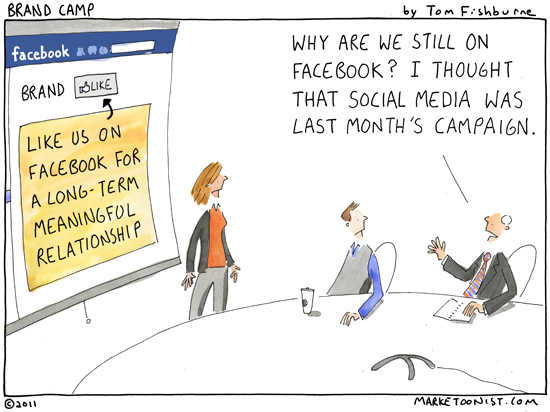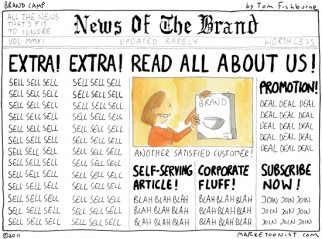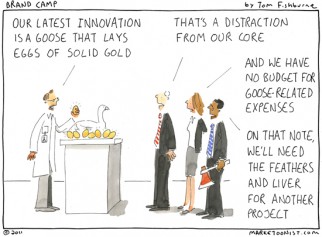Many brands bring an advertising campaign mindset to social media. A campaign has a start date and an end date. One campaign ends to make way for another.
Yet success at social media requires sustained involvement. Social media doesn’t start and end with a “Like”. It grows over time. There can be individual campaigns as part of a social media platform, yet the baseline must be strong and continuous.
Treating social media as a campaign is as ridiculous as treating a call center as a campaign. When done well, social media is an indelibly linked part of the brand experience. Instead of “campaign”, try substituting the word “commitment”. Instead of planning a social media campaign, make a social media commitment.
In my marketing experience, I’ve rarely seen one campaign endure longer than a year or 18 months. Often, a new campaign is introduced with the arrival of a new brand team, a new agency, or a new planning year. Yet, it’s the same consumer and the same brand. In social media, invest in the long haul.
One of the things I’ve liked about my various Marketoonist projects is the long-term continuity. With one client, we’ve published a cartoon a week, every week, for the last 2.5 years. The strength of the connection grows over time.
Aside from a campaign mindset, many brands fail to consider the actual role of brand communication in their consumers’ lives. Andrew Blakeley conducted an interesting “Find us on Facebook” experiment recently after hearing his boss say: “This morning my yoghurt told me to find it on Facebook. It didn’t tell me why, it just told me to find it. Why on Earth would I want to find a yoghurt on Facebook? It’s a yoghurt!”
Andrew vowed to become a “Social Consumer” for one week and to “Like” every brand that asked him.
“My week as a social consumer left me tired and confused. It left my Facebook newsfeed crammed with nonsense, to the point that I could scroll entire pages without seeing my friends. It left me feeling a bit sad for the digital marketers and agencies who were building great content that wasn’t getting the attention it deserved. If you’re reading this and you work in advertising, or you’re a marketer working for a brand – next time you think about telling your consumers to find you on Facebook, consider telling them why.”
Before crafting a social media plan, first become a “social consumer” yourself. What would you personally welcome in your newsfeed? The experiment will shape what you create.



@nicholas_dexter says
I see many companies who build Facebook pages with the wrong motivation. Instead of creating it around a community, they create one with the mindset of “if you’re not on Facebook these days, it makes you look behind the times”, just to satisfy the new standard. If they don’t interact, it’s useless!
For me when it comes to Facebook, there is nothing more annoying than being a fan of an unresponsive company. For example: recently I was on vacation and the menu at this restaurant (near the airport) had a menu section with items named after all of the airlines that serve the area. They it even had a nice little picture of the airline’s tail. I thought it was cool so I snapped picture, tagged the airline and left it on their wall with a cute caption. I checked back for days and got no response; not even a ‘like’. Corporate Facebook accounts serve way more than to announce news articles they are featured in or promote a sale. They are supposed to tear corporation-consumer barriers and provide a window for us to peek inside and realize that they are just a bunch of humans working together. Unfortunately in my experience, I felt their response was “oh it wouldn’t be professional to comment back to this guy!” which just built a tougher blockade.
What do you all think? Agree, disagree? I’d love feedback. Thanks!
dirck pont says
Fully agree with Nicholas’ case!
Hansjörg Leichsenring says
Again a great cartoon and a true story.
Kind regards from Germany
Hansjörg
Sharon Brunt says
I do agree with you – I believe a brand shouldn’t do anything without a clear intent/purpose (even if that intent/purpose evolves along-the-way). If a brand is on facebook without the intention of creating an on-going 2-way dialogue with the people that like/love or even hate it, then shame on them!
Unfortunately the brand/marketing world is full of empty gestures; the way brands behave must change and can, if enough of us are prepared to stick our neck out!
Jamie Plesser says
As Facebook (and social media) moves from the shiny new object toward a state of maturation, I have found that people who do not get the space tend to think of it under the same old paradigms.
At my firm, this is taking the shape of using Facebook and other social media just as we have used other media: promotional marketing levers. And the reaction to performance is viewed under the same and flawed lense: short term ROI.
Engagement through channels such as Facebook is a long term play yet the majority of organizations don’t have the patience to withstand the commitment. Shiny object syndrome strikes again. 😉
Thanks Tom for the post – and I’m jealous of the long term engagements that you have with your clients!
MMacFed says
So true. Same can be said of any marketing program — even advertising. PR, direct, event mktg, and advertising all require ubiquitous and consistent implementation over long periods of time.
Ellen Curtis says
I totally agree with you and MMacFed. At Whizbang, we apply our 4C’s – clarity, consistency, creativity and commitment to all the marketing tactics we deploy. In the case of social, we need:
Clarity – We ask why are we in this space, what do we want to achieve and how will we know if we are successful.
Consistency- We have be consistent with brand personality and posting presence.
Creativity – We have to be creative to continually build and engage our followers.
Commitment – We have to be committed to this effort for the long haul.
In my 22 years of working in marketing, the last C often proves the hardest for all of the reasons you mention.
Steve Schildwachter says
Great post, Tom. I can totally “see” the meeting you have drawn. Decades of campaign launches leave us with a campaign mentality. Paid media is a familiar cycle of plan, buy and post-analyze. Social media is an unfamiliar cycle of plan, buy, measure, adjust, test and tweak. Direct Response gurus actually offer a model, continually tracking customer relationships over the course of a lifetime of purchases (in some cases literally a lifetime). Here’s a SlideShare resource I posted last year: http://www.slideshare.net/SteveSchildwachter/online-media-is-a-process-not-an-event-by-steve-schildwachter It pertained to online media in general, but especially to social media.
Debra says
I’m a marketer and I’ve been actively involved in Facebook to learn how to use it effectively as a marketing tool. Toward that end, I’ve “LIKED” a lot of brands and companies. What I’m learning is that there are a lot of ways to get it wrong – posting 3 or 4 times a day, selling too much too hard too often, being too self-serving in your message, mistaking Facebook for just another broadcast medium are a few of them. There are only a couple of ways to get it right – don’t post more than once a day, make your content fun, interesting, provocative (though still linked to the company or product), sharable…don’t sell too hard, engage with me, don’t just broadcast, and finally, don’t ask me to “LIKE” you and then just sit there…there are a lot of pages out there that are just gathering dust…those are the pages I purge when I’m doing my “spring cleaning”.
Shawn Tzeng says
I feel the biggest challenge with social media is that marketers are enamored with it without thinking about the strategic objectives. Social media is a marketing tactic, not a strategy. They jump right into execution (let’s have a facebook page; let’s imitate XYZ company’s tactics…they seemed to generate a lot of awareness or hits on youtube). Companies need to sit down, think about the overall strategic goals they want to achieve, and then determine the tactics (and determine whether social media is a tactic to pursue). For many companies, social media may not be the best path forward.
Lisa Mane says
Great image! Very pertinent post as just this morning in a meeting we were discussing how to measure facebook activity as an owned space. One of the biggest challenges facing organisations re: social media is their readiness (or lack of) to commit. Many will start a facebook page without due consideration to why they’re doing it, and no concept of how much time and effort it takes to commit to doing it well. Without the appreciation and awareness of the time and resource required to maintain and optimise the space, true measurement against objectives will be next to impossible.
tomfishburne says
Hi all,
Awesome comments and feedback, everyone, thanks! This week’s winners are Debra on the blog and Barry on Facebook. I love Debra’s observations that there are more ways to get it wrong that getting it right. Barry’s note cracked me up about the most inappropriate “Like” request he’d seen and that he was once asked to “Like” an Undertaker. Very funny. Signed cartoons are on the way!
-Tom
janwong says
man, I must say that the cartoon was exactly how it was when I met a potential client earlier this week. Proposed what we can do for their brand and their concern is the “creativity” aspect of things and using the same platforms simply meant we weren’t doing our job – they’re playing the “let’s be on as many networks as possible” game.
Paul Squires says
Hi Tom – just a quick note to say many thanks for your kind coverage of Andrew’s article; it’s greatly appreciated. Keep up the great work.
Best regards,
Paul Squires, Publisher, Imperica
Richard coen says
Great article, campaign implies short term, an activity rather than a cultural transformation that is required for some companies.
But in our experience people who are digitally native do this naturally, social media is just what they do. Social media is part of the culture.
Where it is a campaign, or something that is forced it becomes an adapted behavior rather than a natural behavior and success is more difficult.
Make it natural
Rich says
“This morning my yoghurt told me to find it on Facebook. It didn’t tell me why, it just told me to find it. Why on Earth would I want to find a yoghurt on Facebook? It’s a yoghurt!”
Gold, lol.
I think that you have to make sure to offer something of value to people. If your yogurt told you the following “Follow this yogurt on Facebook to get free coupons for more yogurt” as just one example, it would be a lot more likely to get your attention. Businesses can find ways to get fans through the companies mentioned at http://www.buyfacebookfansreviews.com and others, but actually getting something useful in front of people requires some empathy, which isn’t something all businesses have. You have to put yourself in your customers’ shoes and ask them why they would want to give a crap about you? This thought experiment should lead to a better result in almost anything that you do and can lead to your social media accounts actually bringing in more business for you and lead to real growth.